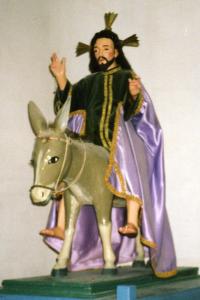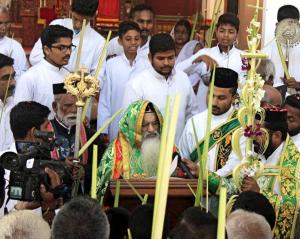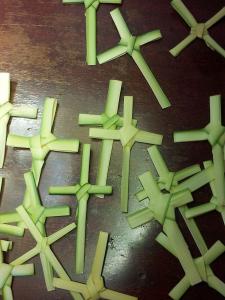 My reading of this very famous scene, the root of the centuries old church celebrations of Palm Sunday, carries a particular weight during this decidedly peculiar time in the world’s history. All humanity is under caution due to the worldwide pandemic of the Coronavirus. In my city of Los Angeles, all bars, dine-in restaurants, gyms, movie theaters, sporting events, concerts are closed or cancelled until further notice. Even my barber has closed his small shop, where he has practiced his trade for nearly 50 years, and is closed until April 1, if not longer. I am a life-long baseball fan, and if games begin by July I will count myself lucky. In reality, the entire season is in real jeopardy.
My reading of this very famous scene, the root of the centuries old church celebrations of Palm Sunday, carries a particular weight during this decidedly peculiar time in the world’s history. All humanity is under caution due to the worldwide pandemic of the Coronavirus. In my city of Los Angeles, all bars, dine-in restaurants, gyms, movie theaters, sporting events, concerts are closed or cancelled until further notice. Even my barber has closed his small shop, where he has practiced his trade for nearly 50 years, and is closed until April 1, if not longer. I am a life-long baseball fan, and if games begin by July I will count myself lucky. In reality, the entire season is in real jeopardy.
Still, most of all that is little more than inconvenient for those of us who have stable resources. For so many, especially those in the service industries—waiters, busboys, hostesses, cooks, Uber and Lyft drivers, and many, many more, who live month to month, it is a very difficult time indeed. There is rent to pay, children to corral, because all public schools are closed, and bills to reckon with, not to mention the sheer psychological toll this whole experience takes on all who work hard but cannot save much for a rainy day. My difficulties tend to be first-world ones, annoying disruptions in my generally comfortable retirement. Many others are hardly so fortunate.
All of us are anxious for someone or something to take all this away: a magic vaccine, a windfall of cash, a place that is not so scary. I fear none of those is very likely, since jobs are being lost, the stock market is crashing, the stores show too many empty shelves, and the virus continues its inexorable spread. We are in for a lengthy siege of several months at least, and there is in the end no place to hide.
First century residents of Roman-occupied Palestine must have had some similar feelings. The Roman soldiers, with their constant demands for tax money, their ubiquitous presence on the streets of every city, their repulsive swagger as world conquerors, must have rankled and infuriated more than a few of the Jewish populace. Why else were there near-constant rebellions, small and large, against the occupiers, fueled by refusals to pay the Roman taxes, the demands of the Romans for obedience, the necessity to keep quiet, to get along, not to rock the Roman boat. Large assemblies of Jews were forbidden, rather like the demands we 21st century Americans are facing today, and though many of us have avoided large gatherings for the good of the whole, our inability to assemble in church, in the shuttered stadiums, restaurants, and movie houses, still makes us restive and distinctly uncomfortable in our fortress homes. In such circumstances there is always the potential for rage erupting, boiling over into riot and mayhem. The 2000-year-old scene from Mark demonstrates the dangers all too clearly.
At last, Jesus and his disciples reach the holy city of Jerusalem, arriving near the city from the east on the Mount of Olives, a spot even today dotted with the glorious twisted trunks and limbs of those ancient trees, some older today than those persons who make up the drama we are about to experience. It was this very location that Zechariah 14:4 speculates that “the Lord” will go forth for the final battle against Israel’s enemies on the day of God’s judgment. As such, one can imagine that the Mount of Olives in Jesus’s day and in the decades before was a place of anti-Roman rallies; perhaps the Romans placed extra troops at the mount to quell such assemblies should they erupt. However, Mark has already made it clear in his story that Jesus and his followers have not come to foment rebellion against Rome, but rather to face ridicule and death (Mark 10:33).
As the scene unfolds, Jesus first sends his disciples to secure for him a “never ridden colt” (Mark 11:2), an animal described in the Greek version of Zech.9:9 as the mount of “a just king and savior” who has come to bring peace. Matthew’s gospel quotes the passage in his account of the scene (Matt.21:5). Could it be that Mark here satirizes the “triumphal processions,” so loved by the Romans by painting a picture of a prophet riding on a donkey’s colt to bring, not power and an oppressive reign, but peace?
The disciples secure the colt by borrowing one from the village, promising to return the beast after “the master” has finished with it. Jesus mounts the colt after his disciples “throw their cloaks over it (the colt)” (Mark 11:7). Apparently in response to these actions of the disciples, the assembled crowd “spread their cloaks on the road,” recalling the actions performed in 2 Kings 9:13 to honor the new king, Jehu. The fact that Jehu’s end was grisly, as was his brief reign over Israel, should give us pause about the end of this procession into Jerusalem. Those who do not cover the road with their cloaks, perhaps the poor who could hardly spare garments so freely, “cut leafy branches from the fields” (Mark 11:8). What they do with these branches is not made clear—do they wave them? Do they cover the road with them? In John’s gospel we find the only place where the famous “palm branches” are mentioned, an apparent reference to the symbols of victory employed by the Maccabean rulers of the 2nd century BCE (1 Macc.13:51: 2 Macc.10:7). Mark knows nothing of this, perhaps suggesting the branch cuttings of a rural crowd.
What the crowd shouts as they witness Jesus’s ride into Jerusalem is important and crucial for proper understanding of Mark’s scene. “Hosanna,” they first cry, an Aramaic appeal meaning “Save us now,” probably a popular phrase uttered by pilgrims on Passover holiday in Jerusalem. It may be clichéd as merely a required pilgrimage cry, but in this context it takes on a far more serious implication; the crowd needs saving, and they hope and expect that this Jesus, riding on a donkey as Israelite kings of old had done (who could ever forget the scene of King Solomon riding to his coronation on David’s sacred mule while followers of the would-be king, Adonijah, flee in terror—1 Kings 1:32-33?), will do exactly that. “Blessed is the one who comes in the name of the Lord” is again a familiar cry of the pilgrim, this time from Psalm 118:25, the psalm used to conclude the Passover meal (Mark 14:26). But again this is far from cliché. The crowd, desperate for a new king, a new savior, calls down the blessings of God on this colt rider, hoping he may at last free them from the Roman yoke.
The fact that Mark is creating something quite new here is made certain by what he has the crowd say next: “Blessed is the coming kingdom of our father David” (Mark 11:10). This phrase is not biblical at all; in no place are we told that David is father, nor is it said that his kingdom is coming. It might be said, as early Christian commentators often claimed, that Is.9:7’s reference to “the throne of David and his kingdom” implies that David’s rule will in the future once again be established. This would explain why any mention of David is made here, and how Mark’s crowd may be imagining that Jesus is somehow the fulfillment of the reign of Israel’s greatest king. I would suggest that this phrase, a Markan creation, is another way that Mark suggests that those around Jesus simply cannot understand who he is and what he has come to do. God’s imperial rule in Mark 1:15 has nothing whatever to do with Davidic power, with Israelite restoration as a great nation among the nations, and those who expect such things from this donkey rider will be sadly disappointed.
Mark ends his scene with a shocking anticlimax. The crowd has been whipped into a frenzy of expectation that Jesus, one blessed by God, one on the verge of fulfilling the rule of David, one who has come to save them all now from the power of Rome, goes right to the temple, the place of Israelite worship and the center of so many stories of Israelite success in the past, looks around the place like some sort of tourist, and without comment leaves for Bethany whence he came before all the hubbub began. And that is it! No shouting crowds now! No magical defeat of the Romans! No restoration of David’s throne! No salvation for Israel! What are we to do now?
Just like that ancient frenzied crowd, we who live under the fear of the virus, are overly anxious for magic to save us, for a true leader who will rally us and return us to our usual lives, where the crack of the bat sounds once again in the ballparks of the land, where hymns are again sung by assembled worshippers, where stores are stocked and lines are short, where movies are shown at stated times, where a meal out is once again common and welcome. We can all hope and imagine that those days will return, but for now we wait in relative silence and isolation. We simply cannot expect an easy or rapid fix to our dilemma, but we can keep our eyes on the mysterious donkey rider, the monarch who is no traditional monarch at all, as he silently rides into the temple, silently gazes at its splendor, silently leaves the city. Yet, he will return, and his capture, torture, death, and surprising return will change the course of all of our lives, whether we are living under plague or whether we have returned to our conceptions of normality. We will not be made whole by power or by the actions of any human being; Mark has told us again and again that if we are to find wholeness, it will come only as we understand and perform that great dual commandment; Love God and neighbor. The donkey rider has come to fix that demand again in our hearts. And even in our current fears and isolation, even in the face of no baseball, to be made whole is to fulfill those great words; in them are the salvation of God and the wholeness of humanity.
(Images from Wikimedia Commons)











